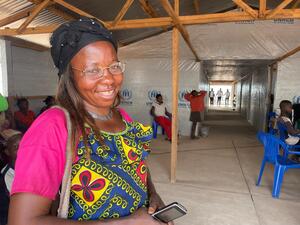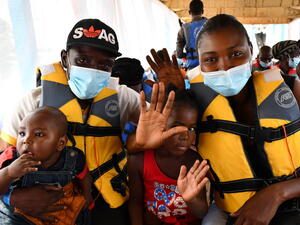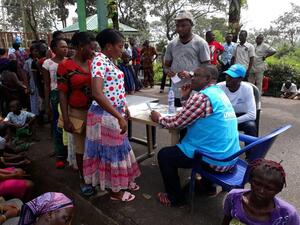First convoy of Sudanese refugees from Uganda arrives in South Sudan
First convoy of Sudanese refugees from Uganda arrives in South Sudan

A food distribution for Sudanese refugees in a camp in Moyo district, Uganda, where the UNHCR repatriation to South Sudan began on Tuesday.
KAMPALA, Uganda, May 2 (UNHCR) - The first convoy carrying Sudanese refugees home from exile in Uganda arrived to a warm welcome Tuesday in the South Sudan town of Kadjo Keji. The convoy, carrying 122 returning refugees, left Tuesday morning from the northern Ugandan district of Moyo and headed for Kadjo Keji, 30 km inside Sudan.
From now until the rainy season in June makes roads impassable, UNHCR plans to operate return convoys four or five times a week, each carrying about 160 refugees. So far, 27,000 of the 174,000 Sudanese refugees in camps in Uganda have registered with the refugee agency to repatriate. Some 40 percent of those refugees were born in the camps in Uganda and have never seen their homeland.
This first convoy follows the signing in late March of a tripartite repatriation agreement between UNHCR, Sudan and Uganda.
Upon arrival in Kadjo Keji, returnees were warmly welcomed by UNHCR staff and local authorities at a temporary way station where they were to spend the night. On Wednesday, UNHCR will provide them with transportation back to their villages. At the way station, returnees were given a three-month food package from the UN World Food Programme (WFP). UNHCR also provided them with a set of household items such as kitchen sets, jerry cans, blankets and sleeping bags.
UNHCR made final preparations for the return in mid-April, when Sudanese officials from the return areas went to Uganda on a "come-and-inform visit" to tell refugee leaders what they could expect back home. Last week, UNHCR sent 13 refugee leaders on a two-day "go-and-see visit" to South Sudan, where they saw for themselves the health, education and water conditions in the area. After talking with the local population in the Kadjo Keji area, the 13 refugee leaders then returned to the settlements in Moyo to tell fellow refugees about their findings so they could make their own decision about returning.
The repatriation was scheduled to start in April, but was put on hold following attacks on UN facilities in South Sudan, including a fatal attack on a UNHCR compound in March. UNHCR sent an assessment team shortly afterwards to evaluate the security situation. The assessment concluded security had improved in areas where UNHCR planned to repatriate people, a finding that was also supported by local authorities.
There are still 350,000 Sudanese refugees in neighbouring countries and some 4 million internally displaced in Sudan itself. Since UNHCR started voluntary repatriation operations in December 2005, some 4,000 refugees have returned from neighbouring countries to South Sudan, including from Kenya, the Central African Republic and Ethiopia.
In a related development Tuesday, UNHCR welcomed the U.S. government's announcement this week of contributions for the agency's 2006 Supplementary Appeals for the return and reintegration of Sudanese refugees to South Sudan, and for protection and assistance to refugees and internally displaced people in Darfur. The U.S. announcement said $12 million would go to the South Sudan repatriation, and $5.56 million for UNHCR's work in Darfur.
UNHCR also welcomed a $100,000 contribution last week from the African Union to support the refugee agency's repatriation process to South Sudan. The money will be earmarked for education, mainly for returnee girls.
By Roberta Russo in Kampala, Uganda








